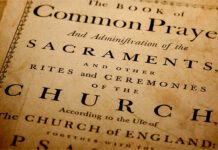All Biblical worship is rooted in an historical event, not an emotional experience. In the Old Testament, every Jewish holy day and feast has an actual event as its genesis. The Sabbath is rooted in God’s act of creation. Passover is rooted in God’s act of salvation from Egypt. The Feast of Tabernacles remembers the pilgrimage through the wilderness, and so on. In the New Testament, the death and resurrection of Jesus Christ display God’s love and the reason for our hope that God will fulfill His good purposes for His creation. In Jesus’ death and resurrection, we see God acting to bring about salvation and new creation.
Our worship, then, is not shaped by what we feel or experience. Our worship must be shaped by who God is. And again, we know who God is not first by mystical promptings and voices but by looking at the great acts of God that reveal who He is. Our worship is rooted in what God has done and will do because the acts of God reveal the character of God. There is no division between “who God is” and “what God does.”
Our worship is not an attempt to praise God for some arbitrary attribute. Instead, as we look to God’s actions within space and time– His great works of creation and salvation– we see who He is and begin to worship. Certainly, emotion can and often will be involved. But it is not a fleeting emotion; it is an emotion that is genuine, not generated, precisely because it is attached to an historical event. That means a worship leader’s first job is not to generate emotion; a worship leader is there to remind people of God’s great acts of creation and salvation in the past and to point them to the moment God’s salvation and new creation come to pass in fullness (Rev. 21).











